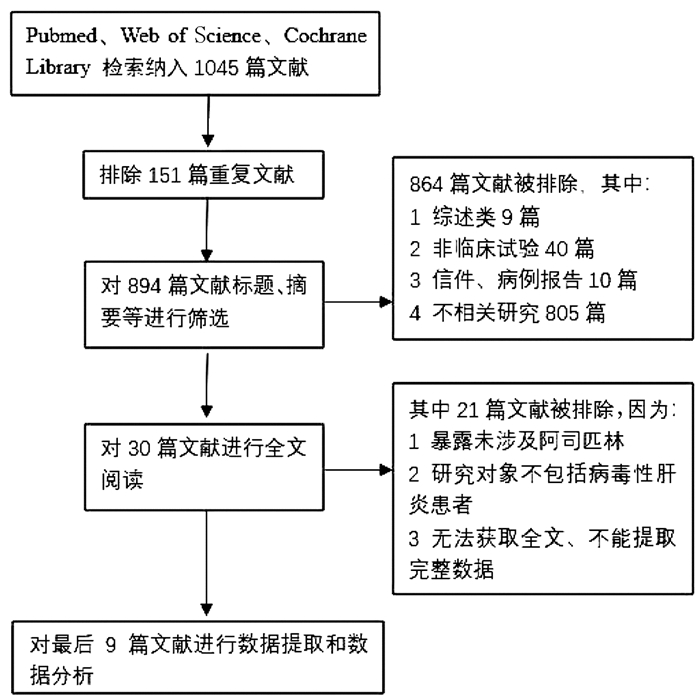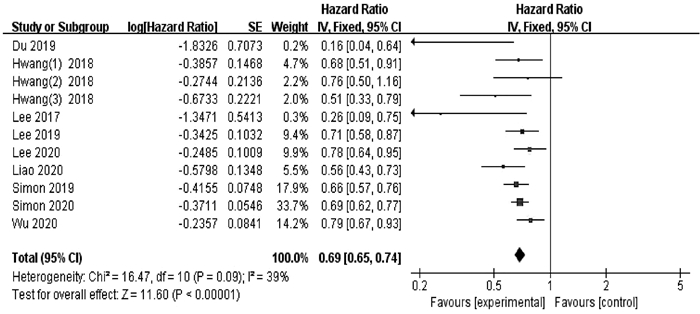| [1] |
BRAY F, FERLAY J, SOERJOMATARAM I, et al. Global cancer statistics 2018: GLOBOCAN estimates of incidence and mortality worldwide for 36 cancers in 185 countries[J]. CA Cancer J Clin, 2018, 68(6): 394-424. DOI: 10.3322/caac.21492. |
| [2] |
BAECKER A, LIU X, LA VECCHIA C, et al. Worldwide incidence of hepatocellular carcinoma cases attributable to major risk factors[J]. Eur J Cancer Prev, 2018, 27(3): 205-212. DOI: 10.1097/CEJ.0000000000000428. |
| [3] |
LOK AS, MCMAHON BJ, BROWN RS Jr, et al. Antiviral therapy for chronic hepatitis B viral infection in adults: A systematic review and meta-analysis[J]. Hepatology, 2016, 63(1): 284-306. DOI: 10.1002/hep.28280. |
| [4] |
BANG CS, SONG IH. Impact of antiviral therapy on hepatocellular carcinoma and mortality in patients with chronic hepatitis C: Systematic review and meta-analysis[J]. BMC Gastroenterol, 2017, 17(1): 46. DOI: 10.1186/s12876-017-0606-9. |
| [5] |
TONG MJ, THEODORO CF, SALVO RT. Late development of hepatocellular carcinoma after viral clearance in patients with chronic hepatitis C: A need for continual surveillance[J]. J Dig Dis, 2018, 19(7): 411-420. DOI: 10.1111/1751-2980.12615. |
| [6] |
NA SK, SONG BC. Development and surveillance of hepatocellular carcinoma in patients with sustained virologic response after antiviral therapy for chronic hepatitis C[J]. Clin Mol Hepatol, 2019, 25(3): 234-244. DOI: 10.3350/cmh.2018.0108. |
| [7] |
PIEPOLI MF, HOES AW, AGEWALL S, et al. 2016 European Guidelines on cardiovascular disease prevention in clinical practice: The sixth joint task force of the European Society of Cardiology and other societies on cardiovascular disease prevention in clinical practice (constituted by representatives of 10 societies and by invited experts)developed with the special contribution of the European Association for Cardiovascular Prevention & Rehabilitation (EACPR)[J]. Eur Heart J, 2016, 37(29): 2315-2381. DOI: 10.1093/eurheartj/ehw106. |
| [8] |
KINOSHITA M, YOKOTE K, ARAI H, et al. Japan Atherosclerosis Society (JAS) guidelines for prevention of atherosclerotic cardiovascular diseases 2017[J]. J Atheroscler Thromb, 2018, 25(9): 846-984. DOI: 10.5551/jat.GL2017. |
| [9] |
BIBBINS-DOMINGO K. Aspirin use for the primary prevention of cardiovascular disease and colorectal cancer: U.S. preventive services task force recommendation statement[J]. Ann Intern Med, 2016, 164(12): 836-845. DOI: 10.7326/M16-0577. |
| [10] |
BOSETTI C, SANTUCCI C, GALLUS S, et al. Aspirin and the risk of colorectal and other digestive tract cancers: An updated meta-analysis through 2019[J]. Ann Oncol, 2020, 31(5): 558-568. DOI: 10.1016/j.annonc.2020.02.012. |
| [11] |
HUA H, ZHANG H, KONG Q, et al. Complex roles of the old drug aspirin in cancer chemoprevention and therapy[J]. Med Res Rev, 2019, 39(1): 114-145. DOI: 10.1002/med.21514. |
| [12] |
HOSSAIN MA, KIM DH, JANG JY, et al. Aspirin enhances doxorubicin-induced apoptosis and reduces tumor growth in human hepatocellular carcinoma cells in vitro and in vivo[J]. Int J Oncol, 2012, 40(5): 1636-1642. DOI: 10.3892/ijo.2012.1359. |
| [13] |
PETRICK JL, SAHASRABUDDHE VV, CHAN AT, et al. NSAID use and risk of hepatocellular carcinoma and intrahepatic cholangiocarcinoma: The Liver Cancer Pooling Project[J]. Cancer Prev Res (Phila), 2015, 8(12): 1156-1162. DOI: 10.1158/1940-6207.CAPR-15-0126. |
| [14] |
SAHASRABUDDHE VV, GUNJA MZ, GRAUBARD BI, et al. Nonsteroidal anti-inflammatory drug use, chronic liver disease, and hepatocellular carcinoma[J]. J Natl Cancer Inst, 2012, 104(23): 1808-1814. DOI: 10.1093/jnci/djs452. |
| [15] |
SIMON TG, MA Y, LUDVIGSSON JF, et al. Association between aspirin use and risk of hepatocellular carcinoma[J]. JAMA Oncol, 2018, 4(12): 1683-1690. DOI: 10.1001/jamaoncol.2018.4154. |
| [16] |
YANG B, PETRICK JL, CHEN J, et al. Associations of NSAID and paracetamol use with risk of primary liver cancer in the Clinical Practice Research Datalink[J]. Cancer Epidemiol, 2016, 43: 105-111. DOI: 10.1016/j.canep.2016.06.009. |
| [17] |
SHIN S, LEE SH, LEE M, et al. Aspirin and the risk of hepatocellular carcinoma development in patients with alcoholic cirrhosis[J]. Medicine (Baltimore), 2020, 99(9): e19008. DOI: 10.1097/MD.0000000000019008. |
| [18] |
WANG S, YU Y, RYAN PM, et al. Association of aspirin therapy with risk of hepatocellular carcinoma: A systematic review and dose-response analysis of cohort studies with 2.5 million participants[J]. Pharmacol Res, 2020, 151: 104585. DOI: 10.1016/j.phrs.2019.104585. |
| [19] |
TAO Y, LI Y, LIU X, et al. Nonsteroidal anti-inflammatory drugs, especially aspirin, are linked to lower risk and better survival of hepatocellular carcinoma: A meta-analysis[J]. Cancer Manag Res, 2018, 10: 2695-2709. DOI: 10.2147/CMAR.S167560. |
| [20] |
PANG Q, JIN H, QU K, et al. The effects of nonsteroidal anti-inflammatory drugs in the incident and recurrent risk of hepatocellular carcinoma: A meta-analysis[J]. Onco Targets Ther, 2017, 10: 4645-4656. DOI: 10.2147/OTT.S143154. |
| [21] |
SIMON TG, DUBERG AS, ALEMAN S, et al. Association of aspirin with hepatocellular carcinoma and liver-related mortality[J]. N Engl J Med, 2020, 382(11): 1018-1028. DOI: 10.1056/NEJMoa1912035. |
| [22] |
LIAO YH, HSU RJ, WANG TH, et al. Aspirin decreases hepatocellular carcinoma risk in hepatitis C virus carriers: A nationwide cohort study[J]. BMC Gastroenterol, 2020, 20(1): 6. DOI: 10.1186/s12876-020-1158-y. |
| [23] |
|
| [24] |
LEE TY, HSU YC, TSENG HC, et al. Association of daily aspirin therapy with hepatocellular carcinoma risk in patients with chronic hepatitis C virus infection[J]. Clin Gastroenterol Hepatol, 2020, 18(12): 2784-2792. e7. DOI: 10.1016/j.cgh.2020.04.036. |
| [25] |
LEE TY, HSU YC, TSENG HC, et al. Association of daily aspirin therapy with risk of hepatocellular carcinoma in patients with chronic hepatitis B[J]. JAMA Intern Med, 2019, 179(5): 633-640. DOI: 10.1001/jamainternmed.2018.8342. |
| [26] |
|
| [27] |
DU ZQ, ZHAO JZ, DONG J, et al. Effect of low-dose aspirin administration on long-term survival of cirrhotic patients after splenectomy: A retrospective single-center study[J]. World J Gastroenterol, 2019, 25(28): 3798-3807. DOI: 10.3748/wjg.v25.i28.3798. |
| [28] |
HWANG IC, CHANG J, KIM K, et al. Aspirin use and risk of hepatocellular carcinoma in a national cohort study of Korean Adults[J]. Sci Rep, 2018, 8(1): 4968. DOI: 10.1038/s41598-018-23343-0. |
| [29] |
LEE M, CHUNG GE, LEE JH, et al. Antiplatelet therapy and the risk of hepatocellular carcinoma in chronic hepatitis B patients on antiviral treatment[J]. Hepatology, 2017, 66(5): 1556-1569. DOI: 10.1002/hep.29318. |
| [30] |
El-SERAG HB. Epidemiology of viral hepatitis and hepatocellular carcinoma[J]. Gastroenterology, 2012, 142(6): 1264-1273. e1261. DOI: 10.1053/j.gastro.2011.12.061. |
| [31] |
ARAVALLI RN, STEER CJ, CRESSMAN ENK. Molecular mechanisms of hepatocellular carcinoma[J]. Hepatology, 2008, 48(6): 2047-2063. DOI: 10.1002/hep.22580. |
| [32] |
COFFELT SB, de VISSER KE. Cancer: Inflammation lights the way to metastasis[J]. Nature, 2014, 507(7490): 48-49. DOI: 10.1038/nature13062. |
| [33] |
ELWOOD PC, MORGAN G, PICKERING JE, et al. Aspirin in the treatment of cancer: Reductions in metastatic spread and in mortality: A systematic review and meta-analyses of published studies[J]. PLoS One, 2016, 11(4): e0152402. DOI: 10.1371/journal.pone.0152402. |
| [34] |
SMITH WL, GARAVITO RM, DEWITT DL. Prostaglandin endoperoxide H synthases (cyclooxygenases)-1 and -2[J]. J Biol Chem, 1996, 271(52): 33157-33160. DOI: 10.1074/jbc.271.52.33157. |
| [35] |
CHEN H, CAI W, CHU E, et al. Hepatic cyclooxygenase-2 overexpression induced spontaneous hepatocellular carcinoma formation in mice[J]. Oncogene, 2017, 36(31): 4415-4426. DOI: 10.1038/onc.2017.73. |
| [36] |
CHEN G, LI X, YANG J, et al. Prognostic significance of cyclooxygenase-2 expression in patients with hepatocellular carcinoma: A meta-analysis[J]. Arch Med Sci, 2016, 12(5): 1110-1117. DOI: 10.5114/aoms.2016.61916. |
| [37] |
HWANG SJ, LUO JC, LI CP, et al. Thrombocytosis: A paraneoplastic syndrome in patients with hepatocellular carcinoma[J]. World J Gastroenterol, 2004, 10(17): 2472-2477. DOI: 10.3748/wjg.v10.i17.2472. |
| [38] |
SIMANEK R, VORMITTAG R, AY C, et al. High platelet count associated with venous thromboembolism in cancer patients: Results from the Vienna Cancer and Thrombosis Study (CATS)[J]. J Thromb Haemost, 2010, 8(1): 114-120. DOI: 10.1111/j.1538-7836.2009.03680.x. |
| [39] |
GAY LJ, FELDING-HABERMANN B. Contribution of platelets to tumour metastasis[J]. Nat Rev Cancer, 2011, 11(2): 123-134. DOI: 10.1038/nrc3004. |
| [40] |
SITIA G, AIOLFI R, DI LUCIA P, et al. Antiplatelet therapy prevents hepatocellular carcinoma and improves survival in a mouse model of chronic hepatitis B[J]. Proc Natl Acad Sci U S A, 2012, 109(32): e2165-e2172. DOI: 10.1073/pnas.1209182109. |
| [41] |
HSU CS, CHAO YC, LIN HH, et al. Systematic review: Impact of interferon-based therapy on HCV-related hepatocellular carcinoma[J]. Sci Rep, 2015, 5: 9954. DOI: 10.1038/srep09954. |
| [42] |
GARCÍA RODRÍGUEZ LA, MARTÍN-PÉREZ M, HENNEKENS CH, et al. Bleeding risk with long-term low-dose aspirin: A systematic review of observational studies[J]. PLoS One, 2016, 11(8): e0160046. DOI: 10.1371/journal.pone.0160046. |
| [43] |
TANTAI XX, YANG LB, WEI ZC, et al. Association of proton pump inhibitors with risk of hepatic encephalopathy in advanced liver disease: A meta-analysis[J]. World J Gastroenterol, 2019, 25(21): 2683-2698. DOI: 10.3748/wjg.v25.i21.2683. |
| [44] |
SCHWEITZER A, HORN J, MIKOLAJCZYK RT, et al. Estimations of worldwide prevalence of chronic hepatitis B virus infection: A systematic review of data published between 1965 and 2013[J]. Lancet, 2015, 386(10003): 1546-1555. DOI: 10.1016/S0140-6736(15)61412-X. |








 下载:
下载:











 DownLoad:
DownLoad:
